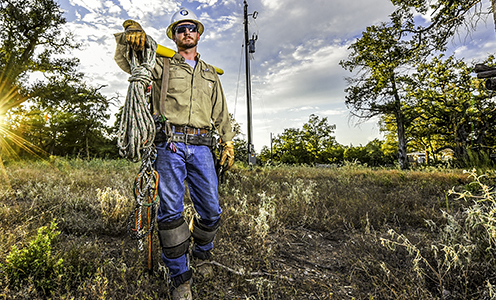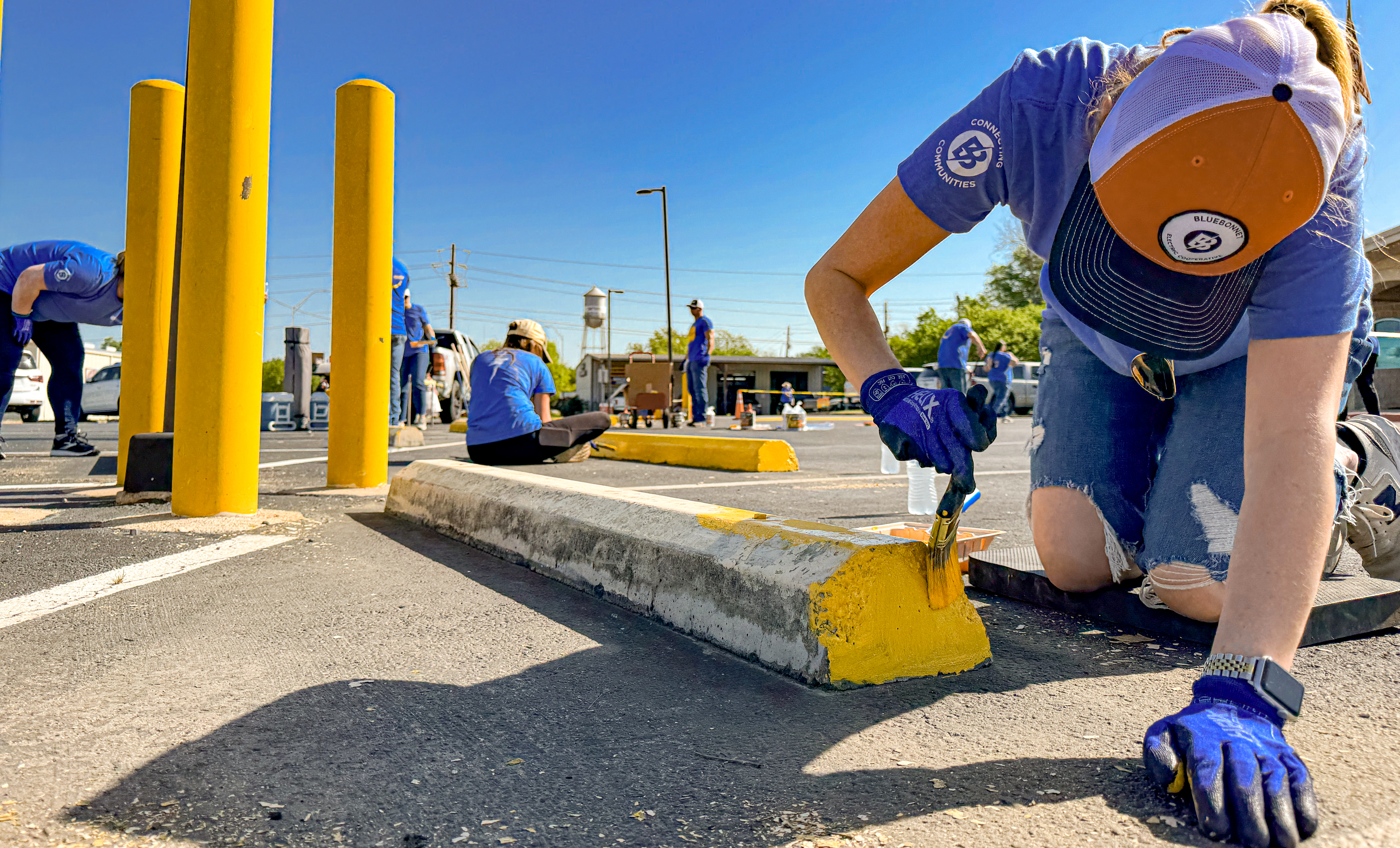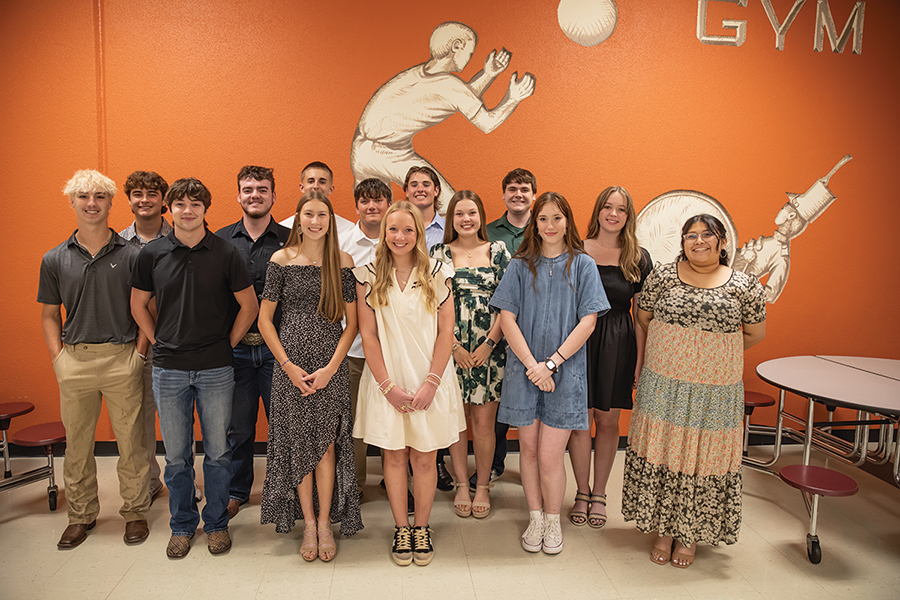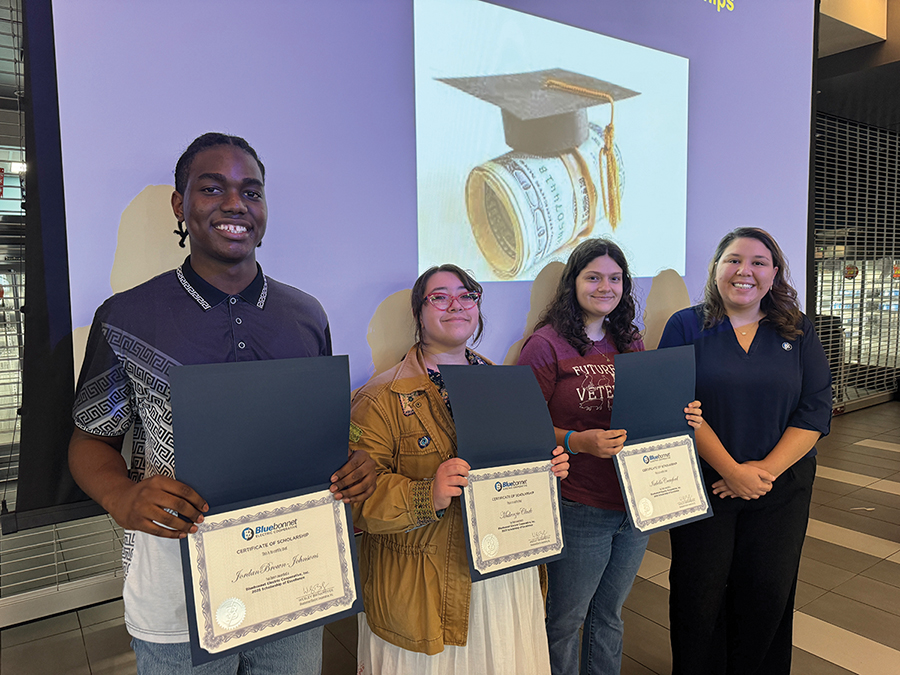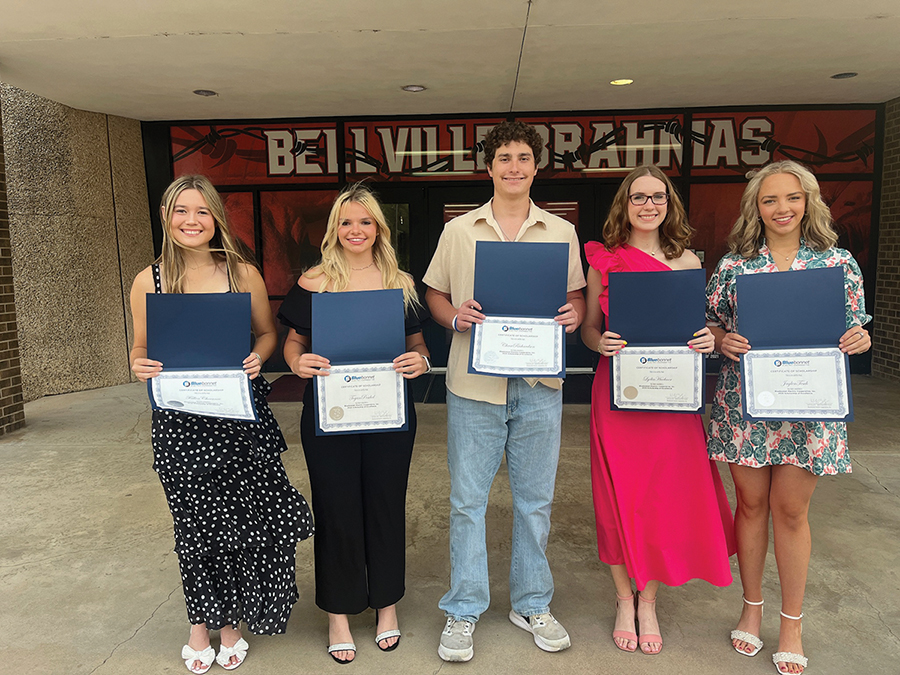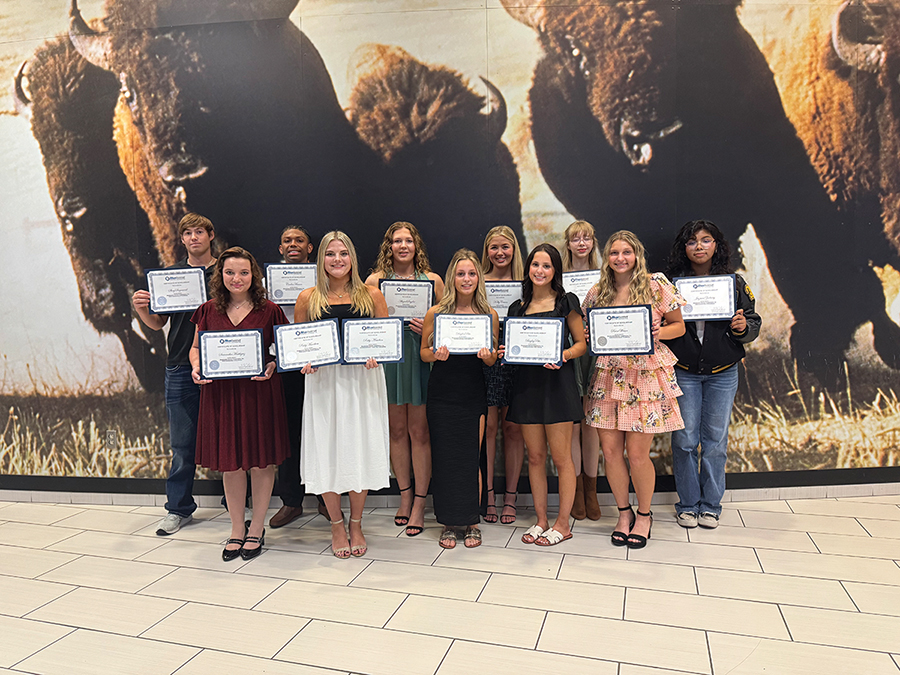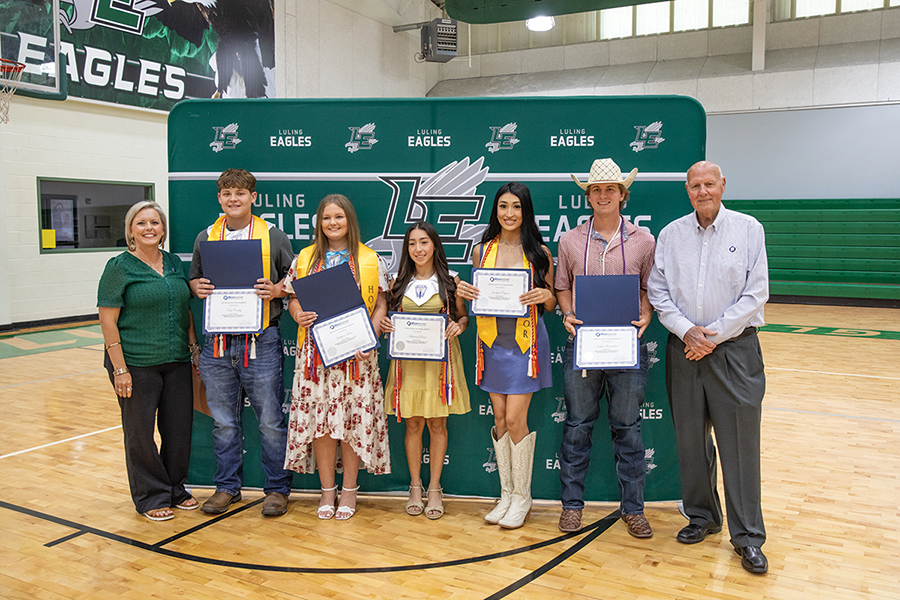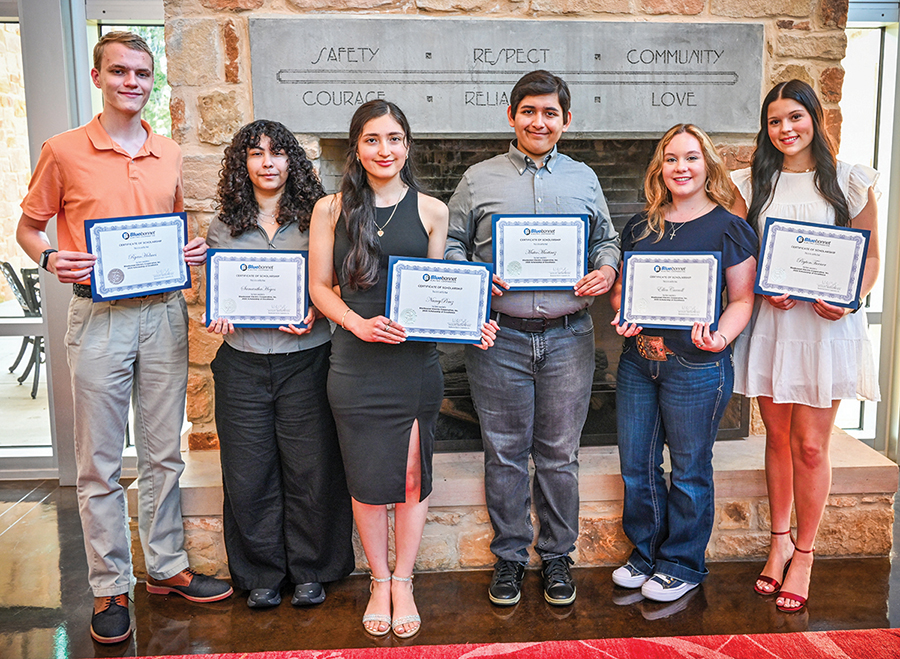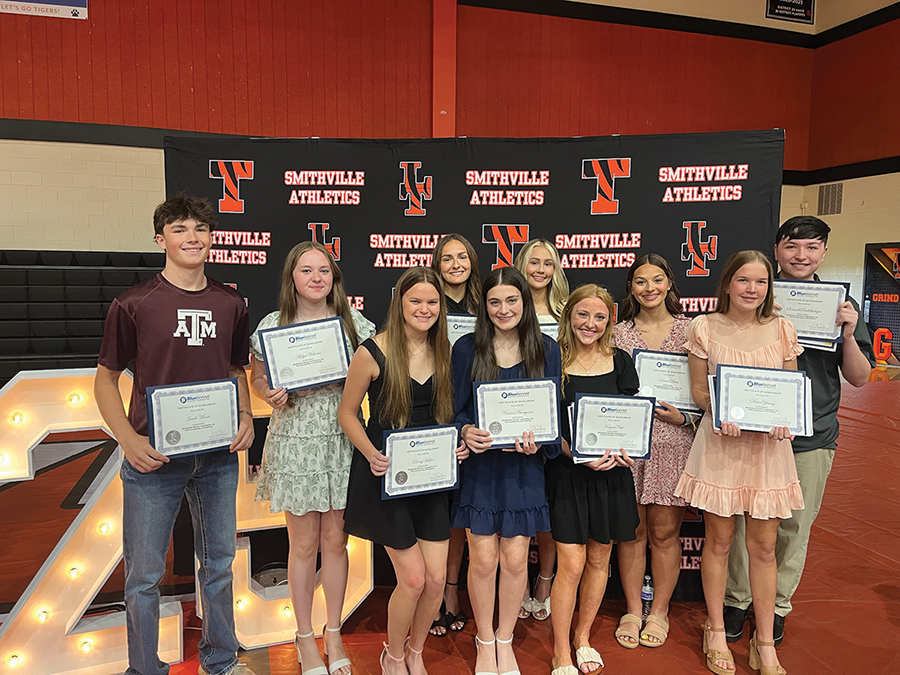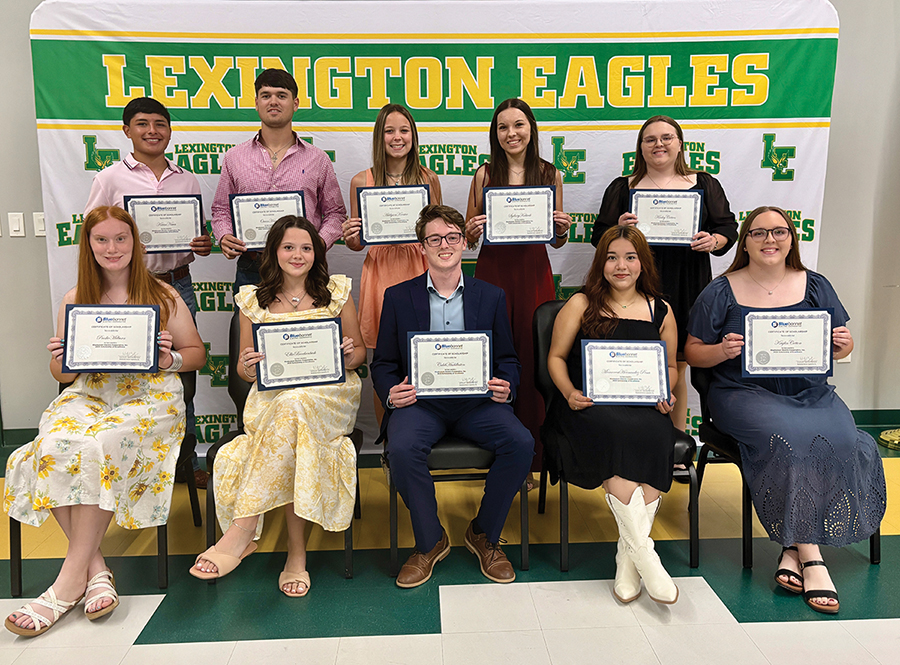The cooperative way
Recent news
Whether you’re buying feed, farming cattle or just flipping a light switch, you’re benefiting from a member-owned cooperative
By Addie Broyles
You know Bluebonnet Electric Cooperative as the company that keeps your lights on. Other cooperatives in the Bluebonnet territory are flipping switches of their own — in ways you might not expect.
Every time an item is purchased at the Burleson County Co-op Store in Caldwell, it’s not just a sale. It’s a return on the investment its members paid to own a stake in the feed store.
When Aubrey and Perrine Noelke of Belle Vie Farm & Kitchen near Thrall sell their pasture-raised meats at Chaparral Coffee in Lockhart, the sale ripples through the Central Texas Farmers Co-op, where success is shared.
And when members of the Washington County Wildlife Society gather to learn about being good stewards of the wildlife roaming their properties, the cooperative-model group’s wisdom is shared with its more than 350 members.
According to the National Cooperative Business Association, about one in three Americans belong to a cooperative of some kind.
Cooperatives — not just electric cooperatives like Bluebonnet — have been the lifeblood of rural America since the early 1900s, when residents started organizing cooperatively run businesses to help them do everything from negotiating a good price for corn to advocating for fair working conditions.
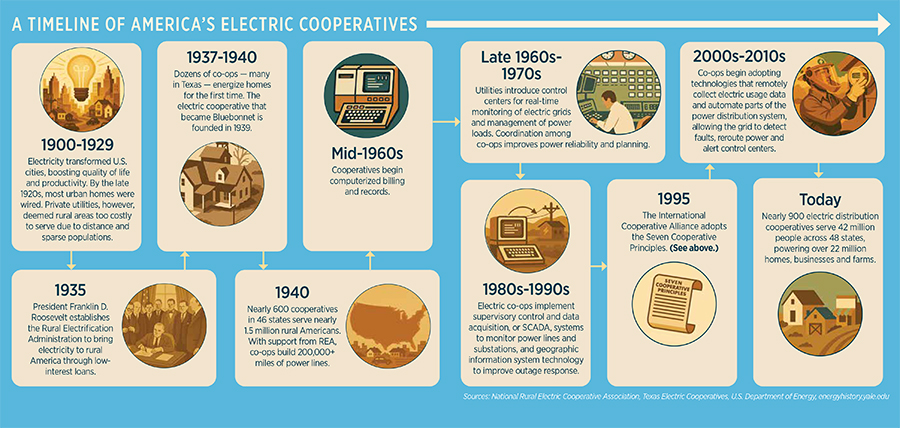
By definition, a cooperative is a business or organization owned and run by the people who use it. Whether they are farmers, consumers or community organizations, the members call the shots and share the benefits, instead of earning profits for outside investors. Co-ops focus on members’ needs, and each member typically has an equal vote in how the cooperative is run, no matter how much cotton they grow or how much electricity they buy.
That is central to the core principles of all cooperatives, no matter what industry they serve. See the 7 cooperative principles, Page 19.
The roots of co-ops in America date back to the 1750s with the first mutually run insurance groups. In 1844, the Rochdale Pioneers, a group of weavers and artisans in England, founded the first consumer cooperative, establishing the model and principles that guide today’s cooperatives.
The National Cooperative Business Association CLUSA International reports that today, there are approximately 65,000 cooperatively run organizations in the United States.
Of all cooperative businesses, electric cooperatives are among those with the largest membership. Some products and businesses that are household names are run by cooperatives, including Ace Hardware, Do-it-Best Corporation, Blue Diamond Almonds, Sunkist, Land O’Lakes, Ocean Spray, Bob’s Red Mill and REI.
CHS Inc., a Minnesota-based grain and agriculture supply co-op, generates the most revenue of any cooperative in the United States — more than $45 billion annually, according to the National Cooperative Bank.
Nearly 900 electric cooperatives operate across 48 states, serving 42 million Americans and powering more than half the nation’s landmass. Electric co-ops maintain over 2.7 million miles of distribution lines nationwide and employ more than half a million people.
In Texas, 76 electric cooperatives serve around 3 million members, according to Texas Electric Cooperatives, an association that represents the interests of the state’s member co-ops. The association advocates for cooperatives at the state and national levels and provides products and services for its members, including the publication of this magazine.
“Texas electric cooperatives have a long history of working to improve the quality of lives of their members and their communities," said Martin Bevins, Texas Electric Cooperative's vice president of communications and member services.
“Across the state and the country co-ops invest in their members' future by providing countless student scholarships for higher education and sponsoring the Government-in-Action Youth Tour which has been providing a once-in-a-lifetime trip to Washington D.C. for co-op youth since 1965. Communities are often safer because of the support co-ops provide to volunteer fire departments and first responders. In fact, two of the seven guiding cooperative principles: Concern for Community and Education, Training and Information are at the center of why co-ops stay focused on programs like these,’’ Bevins said.
Texas is also home to thousands of cooperatives across nearly every sector of the economy, particularly agriculture, according to Christy Lewis, executive director of the Texas Agricultural Cooperative Council. Lewis works with about 250 rural cooperatives across Texas, including those that support farm supply stores, cotton gins and grain elevators.
One of the largest agricultural co-ops in the country is Farmers Cooperative Compress in Lubbock. With approximately 9,300 grower-owners, it is the largest cotton warehousing entity in the world.
Cooperatives like these can help ranchers and farmers negotiate better prices on everything from meat processing to seed. Lewis predicts that cooperatives will play an increasingly critical role in the future of smaller, family-owned farms and ranches across rural Texas.
Rural communities thrive with the help of cooperatively run businesses. The co-ops are often deeply involved in community matters because the residents are also the people making co-op decisions.
Bluebonnet, for example, follows a longstanding tradition of providing more than just electricity to the communities it serves. The cooperative allocates money each year to support community groups and events, schools and scholarships.
In 2025 so far, Bluebonnet has provided 250 cooling fans, 2,160 cases of water and sponsored or made cash donations to 100 events across the service area, including the Lee County Fair in Giddings, the Watermelon Thump in Luling, the Back-to-School Bash in Cedar Creek, the Washington County Fair Shrimp Boil in Brenham and the annual Resource Fair in Manor.
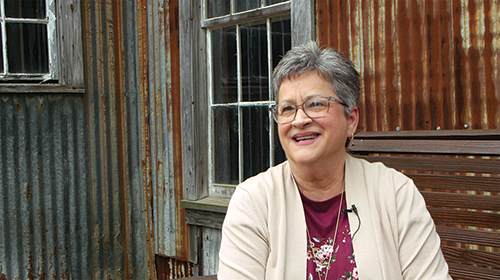
Phyllis Hillhouse can describe how Bluebonnet’s efforts helped her forge a stronger bond with the members of her community.
She manages Zedler Mill, a historic cotton gin along the San Marcos River near Luling. Last year, she worked with Bluebonnet representatives to host an event celebrating the mill’s 100th anniversary. The cooperative set up cooling fans to keep about 800 guests comfortable, and provided an exhibit showing how electricity works.
Being an 18-year member of Bluebonnet has brought Phyllis and her husband, James, other benefits.
When she receives her electric bill, she does a little dance, she said. That’s because the bill is as much as 40% lower than the ones she received in other Texas cities where she has lived. Earlier this summer, she said the bill for their 3,500-square-foot home was less than $150 for each of three consecutive months. “And we keep it cool,” she added.
Hillhouse even had good things to say about the few power outages they have experienced.
“The few times that our electricity has gone out, I get the warning on my phone,” she said of Bluebonnet’s outage text notifications. “They keep me posted. Then, I look out and see trucks troubleshooting. They are Johnny-on-the-spot.”
Whether it’s Bluebonnet, the Burleson County Co-op Store, the Central Texas Farmers Co-op or the Washington County Wildlife Society — or any other type of cooperative — the core principles create connections and shape futures.
That is because cooperatives don’t just serve people — they are people. It is ownership with a heartbeat.
Sources: Texas Electric Cooperatives, Corporation Works, National Cooperative Bank
***
WHAT IS A CO-OP?
Cooperatives are member-owned and democratically run businesses or organizations that return profits through capital credits or dividends. Each member gets one vote — whether farmer, consumer, worker or business — in how their cooperative is run. The U.S. Department of Agriculture names October as National Cooperative Month, launched in 1964 to honor co-ops’ impact on communities and the economy. Nearly one-third of Americans belong to one. The United Nations has identified 2025 as the International Year of Cooperatives.
***
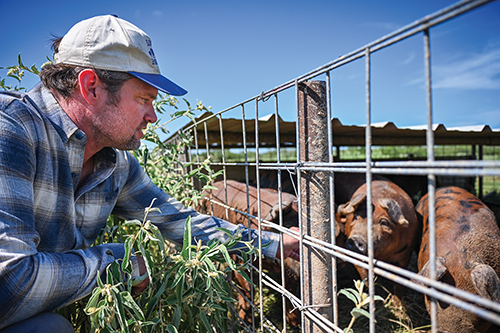
Sarah Beal photo
CENTRAL TEXAS FARMERS CO-OP
- Eight member producers from Hays,
- Caldwell, Blanco, Bastrop, Travis and Williamson counties l Community-supported agriculture model founded in 2016
- Buyers purchase seasonal subscriptions for shares of meat, poultry, vegetables, eggs and cheese from all member farms
- Goods can be purchased weekly at any of the five pickup locations, one of which is Chaparral Coffee in Lockhart
- centraltexasfarmers.com
***
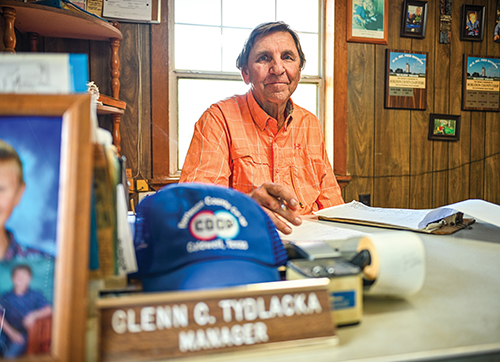
Sarah Beal photo
BURLESON COUNTY CO-OP STORE
- Caldwell, 111 W. Mustang St., about 260 members
- One of the last remaining cooperative feed stores in the Bluebonnet region
- Organized in 1945 by Ben Wolz, who was also a 40-year member of the Bluebonnet Electric Cooperative Board. His son, Lyle, was a Bluebonnet Board member for 30 years
- The farmer-owned cooperative provides everything from feed, fertilizer and seed to veterinary supplies and sporting goods
- $10 one-time membership fee l Members receive a dividend based on their annual purchases
***
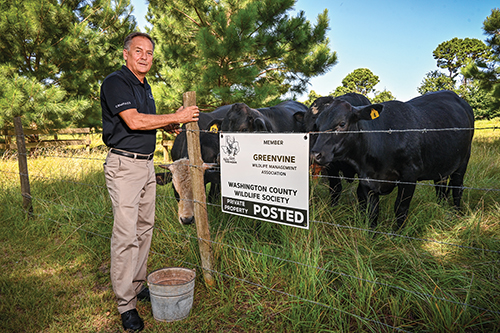
WASHINGTON COUNTY WILDLIFE SOCIETY
- Five wildlife management associations, more than 350 members
- Groups of landowners work cooperatively to find ways to maintain their properties’ habitats and wildlife
- Founded 25 years ago
- The first group of this kind was created in the 1970s to help landowners develop management plans for deer populations threatened by overhunting
- $20-a-year dues; twice yearly meetings with dinner and educational programs from game wardens, biologists and others about land stewardship that extends beyond property lines
***
BLUEBONNET IS A PART OF TEXAS’ POWER LEGACY
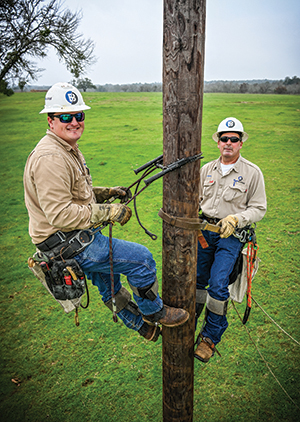
Electric cooperatives like Bluebonnet play a vital role in powering communities, especially in rural areas. In honor of National Cooperative Month, we’re highlighting how your member-owned organization operates on the principles of local governance, service and community investment.
Founded on Aug. 2, 1939, Bluebonnet Electric Cooperative — originally known as the Lower Colorado River Electric Cooperative — was created to bring electricity to rural Central Texas under the Rural Electrification Act signed by President Franklin D. Roosevelt in 1936.
As one of the earliest co-ops in Texas, Bluebonnet quickly expanded access to power in underserved communities. By 1940, the cooperative had 646 miles of line and 1,468 members. In 1965, it was renamed Bluebonnet Electric Cooperative.
Today, Bluebonnet serves more than 142,000 meters across 12,700 miles of power lines in 14 Central Texas counties. Over the past five years, that number has grown by 32%, making Bluebonnet one of the fastest-growing electric cooperatives in the nation.
The co-op prioritizes system reliability, preventive maintenance and long-term infrastructure planning to deliver safe, affordable power. Its electric rates remain among the lowest in Texas, and its member-service commitment continues to meet the needs of a rapidly growing region.
Bluebonnet also supports local communities through grants, scholarships and civic involvement.
***
THE 7 COOPERATIVE PRINCIPLES
These principles were adopted in 1995 by the International Cooperative Alliance, a global organization that supports and promotes cooperatives across all industries. They reflect the core values that define cooperatives: democratic governance, member ownership and a focus on serving members’ needs rather than generating profit.
- Open and voluntary membership: Open to all who can use the services and accept membership responsibilities.
- Democratic member control: Members actively participate in governance and have equal voting rights.
- Members’ economic participation: Members financially support the cooperative in a fair and proportional way based on their use of its services and share in the cooperative’s financial benefits.
- Autonomy and independence: Cooperatives remain self-sufficient, member-controlled organizations. Even when they partner with outside entities, they maintain their independence and identity.
- Education, training and information: Ongoing learning and communication helps members, employees and leaders make informed decisions and support the cooperative’s success.
- Cooperation among cooperatives: Working with other local, regional, national and international cooperatives strengthens services and benefits members and communities.
- Concern for community: Cooperatives are committed to the long-term well-being and development of the communities they serve.
Sources: International Cooperative Alliance, National Rural Electric Cooperative Association
***
MANY KINDS OF COOPERATIVES
From electric utilities and feed stores to coffee shops and cotton gins — cooperatives take many forms. Here are some of the primary types:
UTILITY CO-OPS: Member-owned public utility providers for services like water, electricity or telecommunications.
CONSUMER CO-OPS: Businesses like Burleson County Co-op Store in Caldwell, which lets customers become members and earn a year-end dividend, or companies like REI and Ace Hardware are owned by customer-members.
WORKER CO-OPS: Businesses owned and run by their workers, such as Patchwork Farm in Manor.
INSURANCE CO-OPS: Member-owned mutual insurers serving policyholders, like Nationwide and Farm Bureau Insurance.
HOUSING CO-OPS: Residents pool resources to own and control their buildings or communities, usually in urban areas.
PRODUCER CO-OPS: Producers join to market or process goods, such as the Central Texas Farmers Co-op. Cotton gins and grain elevators are classic examples.
PURCHASING CO-OPS: Individuals, organizations or businesses — like childcare providers or schools — combine buying power to get better prices and terms. Many area schools use co-ops like BuyBoard, TIPS-USA or Texas SmartBuy.
Sources: Cooperation Texas, National Cooperative Business Association
Bluebonnet awards $400,000 in scholarships to 160 area graduating high school seniors
Story by Connie Juarez
Consider it an investment in the future. Bluebonnet Electric Cooperative has awarded 160 scholarships to graduating high school seniors from across the cooperative’s 14-county service area this year. The $2,500 Scholarships of Excellence, totaling $400,000, will help the students achieve their goals of earning college degrees or trade-and-technical school certificates.

“Congratulations to the students who earned a Bluebonnet scholarship this year, and thanks to all the outstanding, hardworking students who participated in the application process,” General Manager Matt Bentke said. “One of Bluebonnet’s values is supporting and investing in the communities in which we live and serve. Awarding these scholarships supports these students who will continue to give back to their communities.”
The scholarships are funded by proceeds from Bluebonnet's Annual Scholarship Golf Tournament as well as former members’ unclaimed capital credit payments that were returned by the state of Texas. Funds for the scholarships do not come from Bluebonnet members’ bill payments and do not affect electric rates.
Sherry Murphy, a Bluebonnet community and development representative, has been organizing the scholarship program for three years.
“It’s one of the highlights of our year,” Murphy said. “We have an opportunity to meet these students and celebrate their hard work. It’s an honor to be part of that.”
After the scholarship presentation at Smithville High School, Lindsey Saunders, the Smithville ISD communications officer, said, “We’re so proud of our students who received this scholarship. It really shows all the hard work they’ve put in.”
Koy Macik, a graduate of Caldwell High School who plans to study animal science at Texas A&M University, is one of this year’s recipients. “We started a cattle operation when my family moved to Caldwell, and I’ve been around animals my whole life,” Macik said. “I feel like it’s something I want to pursue. I want to become a veterinarian. I’m not sure where yet, but I’ll see where the path takes me.”
Others, like Karina Maldonado, are pursuing careers in the medical field. Maldonado, a Brenham High School graduate, will attend Tyler Junior College to study prediagnostic medical sonography. “Visiting with my teachers and taking Certified Medical Assistant courses through Blinn College inspired me to pursue a career in sonography,” Maldonado said. "Eventually, I’d like to focus on oncologic imaging and maybe even do travel sonography, going where I’m needed — especially since there’s a shortage of sonographers in some areas.”
FIRST-GENERATION STUDENTS PURSUE HIGH ASPIRATIONS
Among this year’s recipients, several dozen students said they were first-generation college students — the first in their families to pursue higher education.
Adalinda Ricardez, a 2025 graduate of McDade High School, is one of 32 recipients who received a trade-and-technical scholarship and will be the first in her family to attend college.
When Adalinda starts classes at Austin Community College’s Highland Campus this fall, she’ll already have some credits under her belt. “I took dual credit courses in high school, and I think taking those helped me prepare for college,” she said.
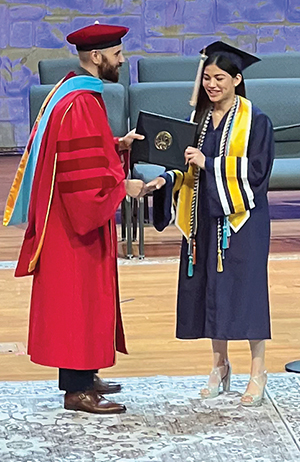
Photo from Skarleth Lagos
At ACC, she plans to complete prerequisite courses, then move into the dental hygiene program and earn an associate degree. From there, she wants to earn a degree from Texas A&M University or The University of Texas at San Antonio, then go to dental school.
Adalinda’s high school years were filled with achievement, both inside and outside the classroom. The clarinetist played in the marching and concert bands all four years and earned MVP honors in concert band. She served as secretary of the student council during her junior and senior years and participated in Pathfinders and Master Guides, programs focused on leadership, service and personal growth. She also volunteered with the Teen Leadership Training program in her junior and senior years.
On top of her academic commitments, Adalinda worked on her school campus as part of McDade ISD’s summer staff, assisted at a local food bank and volunteered time with nursing home residents.
“My family has taught me to persevere and always do my best,” she said. “And now, my younger siblings are watching. Being the first to go to college sets the bar higher for all of us.”
BUILDING STRONG FUTURES

For Bastrop High School graduate Payton Moore, the future looks a lot like the past with new purpose. Payton grew up around construction projects, and she plans to keep it that way. This fall, she will attend Tarleton State University to study construction management, with a goal of continuing the legacy of Moore Construction, a homebuilding business founded in 1900 by her great-great-grandfather.
“The business was passed down through the men in my family — first my great-grandfather, Robert Moore, then my grandfather, David Moore,” Payton said. “My father, David Moore II, wasn’t able to take over the business, and I’d like to make that happen for him.”
Payton’s father died in 2022 at 48 after a two-year illness. “I loved helping out alongside my dad with construction jobs for family members for as long as I can remember,” she said. “I got my first tool set when I was 6.”
Payton’s high school extracurricular work shows her dedication to service, leadership and learning. She was a two-year member of Peer Assistance and Leadership, mentoring younger students and volunteering in the community. She helped organize one of Bastrop’s largest events as part of the Bastrop Homecoming and Rodeo Committee and was a varsity student trainer for the school’s sports medicine team.
She hopes to honor her father and family by learning the ins and outs of the construction business.
“I want to combine my passion for building with interior design and eventually provide people with homes that truly reflect who they are,” Payton said.

Like Payton, Kevin Nava is laying the foundation for a future in construction. Kevin will attend Sam Houston State University this fall to major in construction management. The Lexington High School graduate wants to become a senior project manager.
The degree requires studying building materials, engineering graphics and civil design. Kevin’s leadership qualities were evident throughout his high school years. He was a member of the National Honor Society and a standout athlete. He served as a cross country team captain, earning four-time MVP Runner of the Year honors. Kevin also competed in football and was active in Future Farmers of America.
In recognition of his achievements in academics and sports, Kevin received the Mirabeau B. Lamar Award, presented through local Masonic lodges to honor students who demonstrate outstanding achievement in academics, citizenship, community service and athletics.
Outside the classroom, Kevin volunteered at church events and gained job experience installing window frames for a local glass and mirror company.
“I want to do what I love while leading teams and managing projects,” Kevin said.
COMMITTED TO CARE
Adriana Parra Jaramillo, a graduate of Luling High School, has always had an interest in health care. She plans to attend Texas State University this fall to pursue a nursing degree.

“I was always interested in the medical field and all aspects of it,” Adriana said. “I love what it means to be a nurse and help people.”
In high school, Adriana was co-captain of the dance team, where she earned the Crowd Pleasers Highest GPA Award two years in a row. She participated in the Health Science Yearlong Academy through Dell Medical School and holds certifications in first aid, CPR and bleeding control.
Adriana was also active in Health Occupations Students of America, photography club, book club, and various safety and leadership programs.
In addition to schoolwork, Adriana gained work experience as: junior manager at McDonald’s, sales associate at Best Buy and Boot Barn, and crew member at Whataburger, often working 30 to 40 hours a week.
Adriana is fluent in English and Spanish and hopes to use those skills as a traveling nurse, providing care in locations with limited resources. “I want to learn from different environments and give back wherever I can,” she said.
Skarleth Lagos, a graduate of IDEA Bluff Springs College Preparatory in Austin, is also planning a career in health care, but her focus is on the brain. This fall, she will attend Austin College in Sherman, where she plans to major in neuroscience.

Her interest was sparked during a ninth-grade experience through the Dell Medical Health Sciences program at The University of Texas at Austin. “They let us hold real human brains,” Skarleth said. “It made me realize how powerful the brain is. One organ controls everything. That amazed me.”
Skarleth challenged herself academically with multiple advanced placement courses, including chemistry, biology and statistics.
While in high school, Skarleth was a member of UT’s Yearlong Health Sciences Academy, earning certificates in CPR and bleeding control.
Skarleth hopes to eventually attend Dell Medical School at The University of Texas at Austin. Her goal is to become a doctor and return to the Dale area, where she grew up, bringing specialty medical care to regions that lack it.
Her parents are her biggest inspirations, she said. “They’ve always supported me in the best way they could,” Skarleth said.
FROM CLASSROOM TO CAREER
The impact of Bluebonnet’s investment in students may be best illustrated by those who have gone before this year’s recipients over the scholarship’s 27-year history.
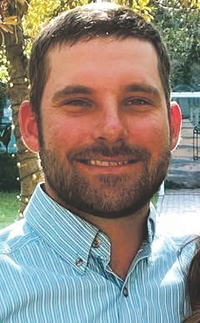
Philip Meuth, a 2009 graduate of Bastrop High School, was a first-generation college student who received a Bluebonnet scholarship to attend Texas State Technical College in Waco. He studied plumbing and pipe fitting, building a foundation for a lasting career.
“I knew I wanted to go into a trade,” Philip said. “Plumbing stood out because it’s a solid, good-paying career.”
Today, he lives in Cedar Creek and works for Brewster Services, a commercial plumbing contractor in San Antonio.
“The Bluebonnet scholarship was money I didn’t have to pay back,” Philip said. “It gave me a leg up. I was humbled to get it.”
“These scholarships are about more than just financial support,” said Bluebonnet’s Sherry Murphy. “They’re about believing in our local students, and seeing many of them come back to work, live and lead in the communities where they started. That’s something we’re deeply proud of.”
Applications for Scholarships of Excellence for 2026 high school graduates will be available in November at bluebonnet.coop/scholarships.
— Sara Abrego and Kirsten Tyler contributed to this story
BY THE NUMBERS
- $400,000 in scholarships awarded this spring
- 32 trade & technical scholarships awarded
- 128 academic scholarships awarded
- 29 high schools represented by recipients
- 27 years Bluebonnet has awarded scholarships
- 160 scholarship recipients in 2025
- 304 leadership positions held in student organizations
- 142 recipients with work experience
- 1,934 organizations applicants were involved in through volunteer and school activities
TOP 10 SCHOOLS RECIPIENTS PLAN TO ATTEND
- Texas A&M University
- Blinn College
- The University of Texas at Austin
- Texas State University
- Austin Community College
- Texas State Technical College
- Tarleton State University
- Sam Houston State University
- Angelo State University
- Universal Technical Institute
TOP 5 ACADEMIC AREAS OF STUDY RECIPIENTS PLAN TO PURSUE
- Health sciences/pre-med
- Agriculture and agribusiness
- Engineering
- Business, finance and accounting
- Animal and veterinary sciences
TOP 5 TRADES RECIPENTS PLAN TO PURSUE
- Nursing
- Welding
- HVAC and electrical
- Diagnostics and imaging
- Real estate
CONGRATULATIONS TO THE 2025 SCHOLARSHIP OF EXCELLENCE RECIPIENTS
BASTROP HIGH SCHOOL
Claire Adams
Joseline Albiter
Ella Davis
Kayla Frank
Anthony Gonzalez
Emma Griesenbeck
Yesliann Matos Cirino
Mark McCarus
Lindsey McFarland
Payton Moore
Zoe Moreno
Adrian Paniagua
Sarah Salazar Hernandez
Jaxon Williams
BELLVILLE HIGH SCHOOL
Fallon Chovanec
Lydia Huebner
Tegan Peschel
Chase Richardson
Jaylen Tesch
BRENHAM HIGH SCHOOL
Zora Austin
Blaine Bartlett
Leyton Blankenburg
Brett Campbell
Denise Carrillo
Samuel Clepper
Garrison Covin
Landon Flisowski
Cullen Halfmann
Brody Hemann
Corbin Janner
Barrett Kohring
Alex Lawhorn
Samantha Mahlmann
Karina Maldonado
Logan Mason
Austin Maurer
Avery Maurer
Hayden Mika
Kord Mikolajchak
Haylie Niemeyer
Luis Ramos
Brandon Schultz
Addison Smith
Bailey Stegint
BURTON HIGH SCHOOL
Bailey Glaesmann
Isabelle Means
Reagan Roemer
Peyton Sigsbee
CALDWELL HIGH SCHOOL
Landon Barnes
Hays Beavers
Dylan Chapman
Cooper Ellis
Brook Fry
Alison Krueger
Brenden Lee
Koy Macik
Dulce Carolina Medina
Kyler Roskey
Madilyn Schneider
Kate Smith
Brycen Suehs
Mia Witherwax
CEDAR CREEK HIGH SCHOOL
Mia Benavides
Margaux Bonneu
Anabel Bordelon
Caleb Farr
Kaylee Fitzhugh
Faith Frank
Jazlene Gomez
Daeylin Gonzalez
Devon James
Nicole Kadura
Brooklyn McCool
Shayla Mendez-Ramirez
Tyler Morgan
Serenity Rivera
Peyton Smith
COLORADO RIVER COLLEGIATE ACADEMY
Jayton Nelson
DEL VALLE HIGH SCHOOL
Ginny Benitez-Perez
Nazariah Cedillo
Azucena Esqueda Rodriguez
DIME BOX HIGH SCHOOL
Leslie Guajardo
Adley Markert
ELGIN HIGH SCHOOL
Monserrat Espinoza-Guzman
Isadora Estrada
Jocelyn Howard
Cayli Johns
Alexander Rico Cuellar
Garrison Vragel
FAYETTEVILLE HIGH SCHOOL
Lawson Fritsch
Rylee Fritsch
GIDDINGS HIGH SCHOOL
Carlos Amaro
Kelby Cowen
Kyler Giles
Samantha Matthijetz
Ruby Meachen
Bayley Pitts
Daylin Pitts
Paige Schreckengost
Shay Siegmund
Abigail Snyder
Reese Weiser
Jazmin Zachary
GRACE LUTHERAN SCHOOL
Avila Colanter
HOMESCHOOL
Ellen Carroll
Paloma Dineen
Ryan Holmes
Mateo Martinez
Brady Masur
Emma Roth
Trey Schumpert
IDEA BLUFF SPRINGS COLLEGE PREPARATORY
Skarleth Lagos
IDEA RUNDBURG COLLEGE PREPARATORY
Melanie Ramirez Mendoza
KIPP AUSTIN COLLEGIATE
Samantha Hoyos
Nancy Perez
LEXINGTON HIGH SCHOOL
Ellie Brockenbush
Kaylin Cotton
Kinley Cotton
Owen Harris
Monserrat Hernandez Pena
Caleb Huddleston
Addyson Koester
Sydney Kubicek
Preslie Milburn
Kevin Nava
Braden Rodgers
LOCKHART HIGH SCHOOL
Roman Moreno
Ricardo Rios
LULING HIGH SCHOOL
Kase Conley
Jaelynn Moses
Adriana Parra
Joselyn Reyna
Joshua Samuelson
MANOR EARLY COLLEGE HIGH SCHOOL
Jordan Brown-Johnson
Makenzie Clark
Isabella Crawford
Mia Esqueda
MANOR NEW TECH HIGH SCHOOL
Kayla Frederick
Chidinma Nwankwo
MANOR SENIOR HIGH SCHOOL
Jordan Clark
McCALLUM HIGH SCHOOL
Nahomy Rivera
McDADE HIGH SCHOOL
Joshua Dube
Kelsey Dube
Sheila Lugo Lopez Lisethe
Adalinda Ricardez
Areli Velazquez
PRAIRIE LEA HIGH SCHOOL
Gabriel Garcia
ROUND ROCK CHRISTIAN ACADEMY
Peyton Turner
SMITHVILLE HIGH SCHOOL
Carina Berryann
Daucie Davis
Kaydence Kimball
Jacob Moore
Darcy Mullen
Kaycee Nutt
Samuel Praditbatuga
Addison Waneck
Ashlyn Wilhelm
Devin Young
SNOOK HIGH SCHOOL
Savannah Davidson
SOMERVILLE HIGH SCHOOL
Savannah Eschete
Applications for Scholarships of Excellence for 2026 graduates will be available in November here
Check out the story as it appears in the August 2025 issue of Texas Co-op Power magazine here.

